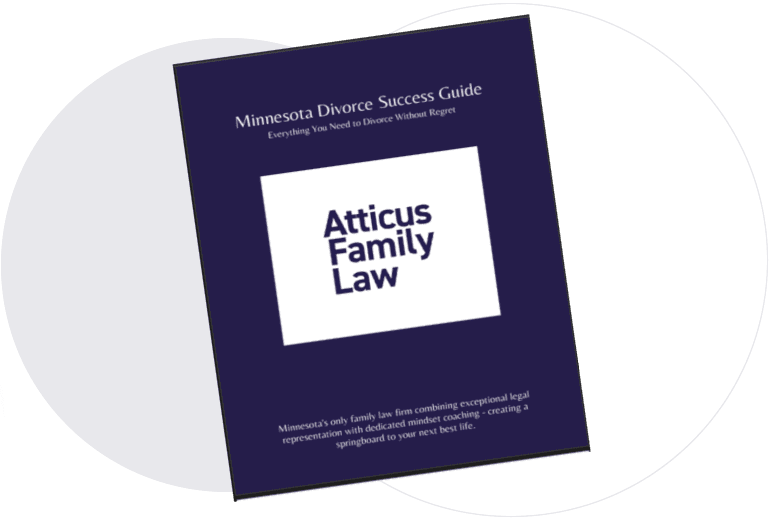Meet Abner, our Client Intake Specialist

Book a 15-minute get-to-know-you call today to get started!
Learn how our integrated approach to legal representation, combined with mindset management, can help. Get your questions answered and learn about our unique approach to protecting what matters
most.
Everyone deserves a fair outcome to life’s toughest transitions.
Is Your Divorce Keeping You
Up At Night?
Worried that a custody decision
could devastate your family’s future?
Afraid divorce might derail your retirement
plans or impact your investments?
Wondering how you’ll manage the emotional
stress throughout this process?
There’s no need to lose sleep. You’re in the right place
Your Path to a Better Future
Starts Here
Sophisticated Legal Representation + Professional Mindset Coaching
Don’t just survive your divorce—thrive beyond it. At Atticus Family Law, we combine sophisticated legal representation with transformative mindset coaching to guide high-net-worth individuals
through complex family transitions.
What Sets Us Apart
Holistic Approach:
Legal strategy paired with emotional support from our client coach
Tailored Solutions:
Customized plans for your unique financial and family situation
Future-Focused:
Building your springboard to a better tomorrow
Our integrated approach empowers you to make confident decisions while protecting what matters most—your family’s well-being and your financial security. Take the first step toward your next
best life. Schedule a consultation today.
For divorce, custody & support cases
Our Proven
3-Step Plan
Schedule a Consultation
Come to our relaxed office, talk over the phone or connect via video to
discuss what matters most to you. We make it easy to connect so that
you can get the help that you need.
Get a Customized Plan
We dig deeper to account for how your needs intersect with the legal obstacles. Then, you’ll get a chance to speak with our professional coach, and we’ll plot the best plan to quickly achieve
your goals towards a bright future.
Start a Future with Peace of Mind
Our execution of your plan with the very best service allows you to secure
the fair outcome you and your family deserve.

Carina Spurlock Paralegal

Jessica Dooley Paralegal

Lauren Fuenzalida Assistant Director of Client Confidence

Abner Sanchez New Client Intake Specialist
Divorce & custody processes
The Typical Divorce &
Custody Processes in Minnesota
Strategy Session
Two weeks prior to filing and service of court documents.
It is essential that we start with our client and their attorney and paralegal from Atticus Family Law meeting to clearly identify all of the client’s objectives. We do this by discussing the
facts, the other people involved, such as the other party and children, and identifying the problems.
Strategy Session
Two weeks prior to filing and service of court documents.
It is essential that we start with our client and their attorney and paralegal from Atticus Family Law meeting to clearly identify all of the client’s objectives. We do this by discussing the
facts, the other people involved, such as the other party and children, and identifying the problems.
Commencing a Case for Divorce or Custody Establishment
The filing of court documents is the start of litigation.
The process officially begins when one party has a Summons and a Petition given to the other party. The person who initiates this process is called the Petitioner. The Petition states the facts
and “pleads” what the Petitioner wants, which includes the applicable concerns for custody, parenting time, child support, assets, debts, spousal maintenance, et cetera.
Initial Case Management Conference
Two – six weeks after the pleadings are filed and served.
Within a few weeks of filing the pleadings for divorce or custody establishment, there will be the first hearing with a judge. At this hearing, the judge, the parties, and their attorneys will
hold a short discussion to introduce the judge, identify the disagreed-upon issues to be resolved, and determine whether there are concerns that need sorting while the case is pending (i.e.,
temporary support, exclusive use of the house, parenting access).
Discovering Information & researching facts
Informally it starts immediately; Formal requests start after ICMC.
In order to reach any agreement, all information relevant to the issues needs to be known; inevitably, there is information and documents that one spouse has access to that the other does not.
Colloquially we refer to this as “discovery.”
Temporary Relief Hearing
Two – five weeks after the ICMC.
In some cases, particularly if there are children involved, certain matters must be addressed early in the process. Minor children cannot wait several months to be told where they will sleep
each night, for example. In these cases, a temporary relief hearing may be held to decide how certain time-sensitive matters will be handled while the case is in progress.
Mediation or Early Neutral Evaluation
Anytime, but usually after the initial discovery.
All Minnesota courts require that both parties in a contested family law matter first try to reach a settlement outside of court through a process called alternative dispute resolution (ADR).
There are several forms of ADR, with the most common being mediation and early neutral evaluations.
Pretrial Hearing
About six months after the ICMC.
A few months after the ICMC the court will hold a Pretrial Hearing. Often the courts expect the parties to use that morning or afternoon to continue to discuss and negotiate the issues to reach
further agreements.
Final Trial
Usually, nine months to a year after the start of litigation.
If all attempts at reaching an agreement fail, then your divorce or child custody case will have to be decided by a judge at trial.
Implementation
Legal work by attorneys completed in 20-60 days after final decree.
After a decree has been issued by the court, either because the parties reached a full agreement or there was a trial, the terms of the decree must be implemented.
Checkout Session
60 days after the final decree.
Once the attorney implementation work is done, our client will meet for the last time with their attorney. The purpose of a checkout is to make sure the client has a full understanding of their
decree, they know best practices and hacks for managing their relationship with their ex, they anticipate what changes are going to be needed to support and parenting time as incomes and
circumstances change in the years to come, they know post-representation questions will be answered without charge, and otherwise close their case.
Explore our legal services to see how we can help.
Contact us now
We Secure Fair Outcomes
For Bright Futures

FREE Download of the Minnesota Divorce Success Guide: Everything you need to divorce without regret.
- Decisions about the children’s future and parenting time.
- Responsibility for spouse’s debt and spending.
- Separation of assets and income.
- Who will work on my case?
- How long will it all take?
- How will you accomplish my goals?
- How much will it cost and what do the fees include?
Want To Get A Head Start?
Enter your information to download these guides to get a leg up in securing a fair outcome in your family law case.
Atticus Blog Posts

Schedule a consultation
Ready For A Fresh Start?
Ready to take the first step towards a brighter future?
Click the button below to connect with our experienced divorce attorney and start your journey toward a better tomorrow.
Get Started Now














![What happens when a spouse chooses not to work full-time after divorce [...]](https://atticusfamilylaw.com/wp-content/uploads/2025/05/AdobeStock_135839688-412x282.jpg)

